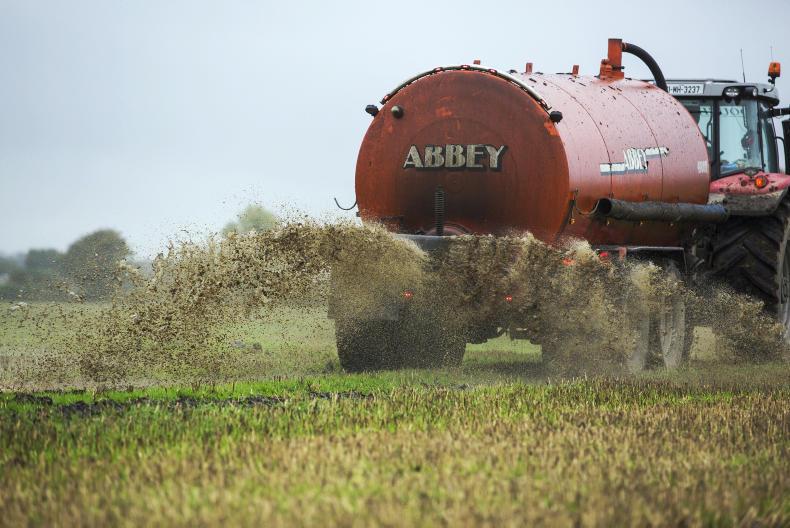Asked by a farmer about the recent situation where slurry spreading was allowed during the bad early autumn weather, but banned when conditions improved in November, Department of Agriculture chief inspector Bill Callanan said: “We have investigated the issue of flexibility at EU level. It will allow you to spread when weather is good, but it will also restrict you to spread when weather is bad.”
This could mean amounts of time outside the current closed period when slurry cannot be spread and must be stored instead.
“We have a problem with storage on many dairy farms, which needs to be addressed,” Callanan warned.
“If people want to go with this flexibility, they’re going to need more concrete.”
Listen to an interview with Bill Callanan in our podcast below:
While he said that trailing shoes would not solve all nitrate-related issues, Callanan welcomed the “change of mindset” illustrated by the increase in the number of grant applications for the device.
“Our area under derogation has increased by 25%. Within that use, there’s a responsibility,” he said.
“If I’m gaining by it, I should be responsible in what I’m doing, just not in terms of the next inspection.”
Regulations and inspections only act as a safety net, but it is up to farmers to achieve the best environmental impact from the way they are farming, Callanan argued.
The Departments of Agriculture and of Housing and Local Government are currently putting the final touch to a new nitrates action programme to be presented to the European Commission in a bid to maintain Ireland’s derogation.
Speaking at Dairy Day, IFA dairy chairman Sean O’Leary said the derogation was “essential” and expressed confidence that it would be maintained.
Read more
Editorial: Nitrates Action Programme
Full coverage: Dairy Day 2017
Asked by a farmer about the recent situation where slurry spreading was allowed during the bad early autumn weather, but banned when conditions improved in November, Department of Agriculture chief inspector Bill Callanan said: “We have investigated the issue of flexibility at EU level. It will allow you to spread when weather is good, but it will also restrict you to spread when weather is bad.”
This could mean amounts of time outside the current closed period when slurry cannot be spread and must be stored instead.
“We have a problem with storage on many dairy farms, which needs to be addressed,” Callanan warned.
“If people want to go with this flexibility, they’re going to need more concrete.”
Listen to an interview with Bill Callanan in our podcast below:
While he said that trailing shoes would not solve all nitrate-related issues, Callanan welcomed the “change of mindset” illustrated by the increase in the number of grant applications for the device.
“Our area under derogation has increased by 25%. Within that use, there’s a responsibility,” he said.
“If I’m gaining by it, I should be responsible in what I’m doing, just not in terms of the next inspection.”
Regulations and inspections only act as a safety net, but it is up to farmers to achieve the best environmental impact from the way they are farming, Callanan argued.
The Departments of Agriculture and of Housing and Local Government are currently putting the final touch to a new nitrates action programme to be presented to the European Commission in a bid to maintain Ireland’s derogation.
Speaking at Dairy Day, IFA dairy chairman Sean O’Leary said the derogation was “essential” and expressed confidence that it would be maintained.
Read more
Editorial: Nitrates Action Programme
Full coverage: Dairy Day 2017





SHARING OPTIONS